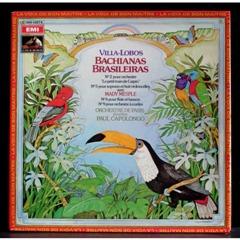Villa-Lobos - Bachianas Brasileiras Nos.2, 5, 6, 9 (Capolongo) [1973]
Villa-Lobos - Bachianas Brasileiras Nos.2, 5, 6, 9 (Capolongo) [1973]

Bachianas Brasileiras No. 2 For Orchestra A1 Preludio - O Canto Do Capadocio 8:26 A2 Aria - O Canta Da Nossa Terra 6:25 A3 Dansa - Lembrança Do Sertão 5:27 A4 Tocatta - O Tremzinho Do Caipira 4:39 Bachianas Brasileiras No. 5 For Soprano And Eight Cellos B1 Aria (Cantilena) 6:27 B2 Dansa (Martelo) 4:49 Bachianas Brasileiras No. 6 For Flute And Bassoon B3 Aria (Chôros) 3:43 B4 Fantasia 4:55 Bachianas Brasileiras No. 9 For String Orchestra B5 Preludio E Fuga 9:19 Mady Mesplé - soprano Albert Tétard - cello solo Michel Debost - flute André Sennedat - bassoon Orchestre de Paris Paul Capolongo – conductor
When the name Mady Mesplé comes up it is generally in relation to her great recording of the "Flower Duet" from Leo Delibes' opera Lakmé with Danielle Millet. However, relatively few know of the outstanding recording she made at the Salle Wagram in 1973 of Heitor Villa-Lobos' Bachianas Brasileiras No. 5 with eight cellos drawn from the ranks of the Orchestre de Paris. Here it is included, along with Bachianas Brasileiras No. 2, No. 6, and No. 9 as recorded by the Orchestre de Paris under Paul Capolongo; the band decided to forego a conductor in the Bachianas Brasileiras No. 5. The recording is warm and spacious in an ambience well suited to the feeling of mystery and wilderness that Villa-Lobos sought to evoke in these pieces. Villa-Lobos himself enjoyed working with French orchestras and the slight looseness to these performances serves his music well, although it is not spot-on perfect; Marcel Gallègue's handling of the trombone solo in the Bachianas Brasileiras No. 2 has a bit of a circus atmosphere to it and is a little cornball, but they impart a great lumbering and lurching quality to "The Little Train of the Caipira." As you might expect, Mesplé's voice is a good deal lighter than Bidú Sayão in her famous 1945 recording of the work, but it is still a ravishing performance with the exception that the eight cellos seem a bit distant in the recording; likewise, the flute and bassoon could've stood to be a bit more focused toward the foreground in the Bachianas Brasileiras No. 6. However, the Bachianas Brasileiras No. 9 is beautifully done, and overall this EMI Classics disc, originally recorded by the French division of HMV Le voix de son maître, is a good general introduction to Villa-Lobos crucial Bachianas Brasileiras series and a nice opportunity to hear Mady Mesplé in something other than opera. --- Uncle Dave Lewis, Rovi
download: uploaded yandex 4shared mediafire solidfiles mega zalivalka filecloudio anonfiles oboom
Last Updated (Thursday, 19 June 2014 14:57)








